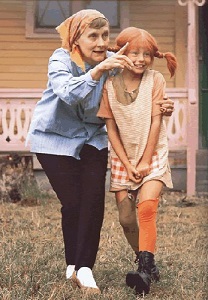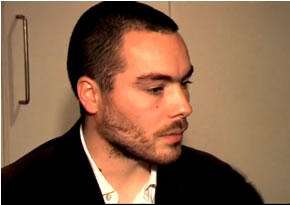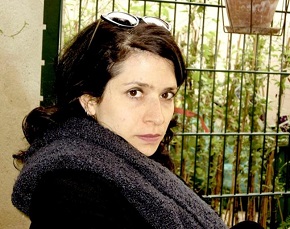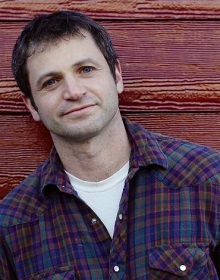De Amerikaanse dichter, schrijver en vertaler Norbert Krapf werd geboren op 14 november 1943 in Jasper, Indiana. Zie ook alle tags voor Norbert Krapf op dit blog.
The Mayberry Café
A high-finned squad car
welcomes your arrival
on the town square.
That booth in the corner
is all for you
& the girl on your arm.
If you want
meatloaf and gravy
it’s all yours, baby.
Ain’t nothin’ but
Elvis on the radio
& black & white on TV.
Whenever you come
back you are, once again,
King for a Day, oh yeah!
Prolog: Angel of Power and Protection
—Sculpture, Bridge to Vatican City, Rome—
What happens when the Angel
falls asleep after the mother
and father who held the baby
have to walk back into their lives
and the boy walks out into
the world and a servant
of God touches him wrong
when the parents aren’t looking?
By the time he is ready to
cross the bridge to Vatican City
his feet will not move forward
but turn in the opposite direction.
It is decades before he
can talk to the old God
by finding his own sacred places
and a new language for praying.
Norbert Krapf (Jasper, 14 november1943)
De Zweedse schrijfster Astrid Lindgren werd als Astrid Ericsson geboren op 14 november 1907 en groeide op op de boerderij Näs in Vimmerby in Småland. Zie ook alle tags voor Astrid Lindgren op dit blog.
Uit: Pippi Langstrumpf (Vertaald door Cäcilie Heinig)
„Er hatte recht. Pippi war ein sehr merkwürdiges Kind. Das allermerkwürdigste an ihr war, daß sie so stark war. Sie war so furchtbar stark, daß es in der ganzen Welt keinen Schutzmann gab, der so stark war wie sie.
Sie konnte ein ganzes Pferd hochheben, wenn sie wollte. Und das wollte sie. Sie hatte ein
eigenes Pferd, das sie für eines ihrer vielen Goldstücke gekauft hatte, an demselben Tage, an dem sie heimgekommen war. Sie hatte sich immer nach einem eigenen Pferd gesehnt. Und jetzt wohnte es auf der Veranda. Aber wenn Pippi ihren Nachmittagskaffee dort trinken wollte, hob sie es ohne weiteres in den Garten hinaus.
Neben der Villa war ein anderer Garten und darin ein anderes Haus. In dem Haus wohnten
ein Vater und eine Mutter mit ihren beiden netten Kindern, einem Jungen und einem Mädchen. Der Junge hieß Thomas und das Mädchen Annika. Das waren zwei sehr liebe, wohlerzogene und artige Kinder. Niemals biß Thomas an seinen Nägeln, immer tat er das, was ihm seine Mutter sagte. Annika murrte niemals, wenn sie nicht ihren Willen bekam. Sie sah immer ordentlich aus in ihren gebügelten Baumwollkleidern, und sie nahm sich sehr in acht, daß sie sich nicht schmutzig machte. Thomas und Annika spielten hübsch zusammen in ihrem Garten, aber sie hatten sich oft einen Spielkameraden gewünscht, und zu der Zeit, als Pippi noch mit ihrem Vater auf dem Meer herumsegelte, standen sie mitunter am Gartenzaun und sagten:
„Zu dumm, daß niemand hier in dieses Haus zieht. Hier sollte jemand wohnen, jemand, der Kinder hat.“

Astrid Lindgren (14 november 1907 – 28 januari 2002)
Hier met Inger Nilsson als Pippi Langkous in 1968
De Nederlandse schrijver en columnist Jonathan van het Reve werd geboren op 14 november 1983 in Amsterdam. Zie ook alle tags voor Jonathan van het Reve op dit blog.
Uit: Surinaamse Amsterdammers (Column)
Inderdaad: ‘de’ allochtoon bestaat niet. Maar bestaat ‘de’ Surinamer dan wel? Of ‘de’ Oost-Europeaan? Natuurlijk niet, net zomin als ‘de’ frisdrank bestaat. Zo gaat dat nu eenmaal met woorden, die duiden vaak een hele verzameling aan. Hoe ver je wilt ‘inzoomen’, hangt van de situatie af: soms is het woord ‘sinas’ handig, soms kun je beter ‘Fanta’ zeggen. Het evidente verschil tussen cola en tonic is geen logische reden om het woord ‘frisdrank’ te verbieden.
Wat moeten ambtenaren nu zeggen als ze het willen hebben over de groep die tot deze week met ‘allochtonen’ werd aangeduid? Immigranten-en-hun-kinderen is te lang, bovendien heb je het dan alsnog over die groep, en dat mag juist niet. Op de vraag van AT5 of ‘bepaalde problematiek’ nog wel bespreekbaar zou blijven, zei Akel: ‘Een heel recent en goed voorbeeld is obesitas. Veel Turkse Amsterdammers hebben last van obesitas. Nou, dan heb je het over “de Turkse Amsterdamse kinderen”, en zeg je niet: “de allochtonen zijn te dik”.’
Dus dáár gaat het om: er zijn blijkbaar ambtenaren die bij cijfers over ‘sinas’ liever over ‘frisdrank’ praten. Hierdoor ontstaat, in dit geval, het beeld dat ‘de allochtonen’ te dik zijn. De oplossing van de PvdA is om het woord ‘allochtoon’ te verbieden, zodat voor iedereen duidelijk is dat alleen Turkse kinderen te dik zijn.

Jonathan van het Reve (Amsterdam, 14 november 1983)
De Vlaamse schrijver, dichter, politiek activist en componist René Desiderius de Clercq werd geboren in Deerlijk op 14 november 1877. Zie ook alle tags voor René de Clercq op dit blog.
Klein moederke
Moeder zit te driegen
Aan een mantelzoom.
Zusje moet nu wiegen:
Zoeteke, slaap en droom.
Broederke, broederke mijn,
Laat mij uw moederke zijn.
Dekken zal u zusje,
Ligt ge blootgewoeld;
Kussen met een kusje
Dat ge bijna niet voelt.
Broederke, broederke mijn,
Laat mij uw moederke zijn!
Moet ge mee naar schole,
Dwars door weer en wind,
Kom dan stil gescholen
Onder die mantel, kind.
Broederke, broederke mijn,
Laat mij uw moederke zijn.
Poes
Poes-poes-poes is thuis.
Wat kan bollen
zal ze rollen,
rukken lappen uit en lint.
Poes-poes-poes is thuis.
Poes-poes-poes is thuis.
Voor de krauwkens
van haar klauwkens,
vreest alleen een heel klein kind
en een oude muis.
René de Clercq (14 november 1877 – 12 juni 1932)
Gedenkbeeld in Deerlijk
De Engels-Mexicaanse schrijfster Chloe Aridjis werd geboren in New York op 6 november 1971 (en dus niet op 14 november zoals eerder vermeld). Zie ook alle tags voor Chloe Aridjis op dit blog.
Uit: Assunder
« Only time can distinguish us. Yet museum acedia isn’t triggered by a crisis of faith or the shifting angle of the sun and, what’s more, my profession is actually suited to those afflicted by it, perfect for individuals who are unconcerned with their position in the world and have fallen prey to a relatively permanent mental or physical sloth. The museum provides an activity for which we are paid to do little more than stand or sit for hours contemplating immobile images and mobile figures.
Occasionally I remind myself that I could have become a dozen things in life. I could have finished university, got a degree in English, perhaps added some letters after my name. I could have had a desk and a fountain pen, people knocking at the door bringing in papers to sign. Or, at the very least, my own filing cabinet and phone extension. But I have always been more interested in being than becoming, and as soon as I stumbled upon this job I knew nothing would budge me. Ambition has never been high on the list, nor marriage or adventure: the only thing that occasionally tempts me is the thought of another museum.
And I admit that at first I was more than a little jealous of the guards at Tate Modern, watching over their collection housed within an old power station, yet the energy being generated, while neither nuclear nor electric, came with its own set of perils. But it wasn’t until the Scandinavian artist set up an immense fake sun in the Turbine Hall that I thanked my guardian angels for my job at the National Gallery. »

Chloe Aridjis (New York, 6 november 1971)
Onafhankelijk van geboortedata:
De Amerikaanse schrijver Peter Orner werd in 1968 in Chicago geboren. Zie ook alle tags voor Peter Orner op dit blog.
Uit: Love and Shame and Love
“Wait, you’re a what?”
“It’s a new undergraduate major.”
“Weird.”
“You?”
“Philosophy.”
“Philosophy. Interesting. Really. And difficult. Wow, philosophy, wow. I’ve read Kierkegaard. God ordered Abraham to murder his kid and Abraham said, Okay okay, whatever you say, not a problem. He didn’t even try to get out of it. He didn’t run away to Nineveh, which sounds to me like a pretty fun place. That’s faith? I mean, at least Jonah gave defying a totally unreasonable God a shot. And Kierkegaard says Abraham’s a great man? To me, he just sounds like a bad dad. Did I miss something?”
She just let his gibberish float there between them without answering. Lunch at a Chinese restaurant on South University. The place was dark, the blinds drawn against the afternoon sun. Above each table a small round bulb; Popper thought, Each table its own sad moon. This isn’t going very well at all. She is from Wisconsin and her name is Katherine but her father had called her Kat since she was six minutes old. Kat Rubin. I’ll never see her again.
“Who do you read, then?”
“Oh, you know, lately a lotta Ray Carver.”
“Who?”
“People call him a minimalist, but that’s really a misnomer. Carver just doesn’t use a barrel of words to say something he could say in half a phrase. He’s the poet of modern despair. Drunken, laconic husbands. Lonely, cheating wives. You know, the gritty truths—”
“Fuck that. Are you related to Karl Popper?”

Peter Orner (Chicago, 1968)
Zie voor nog meer schrijvers van de 14e november ook mijn drie blogs van 14 november 2011.
